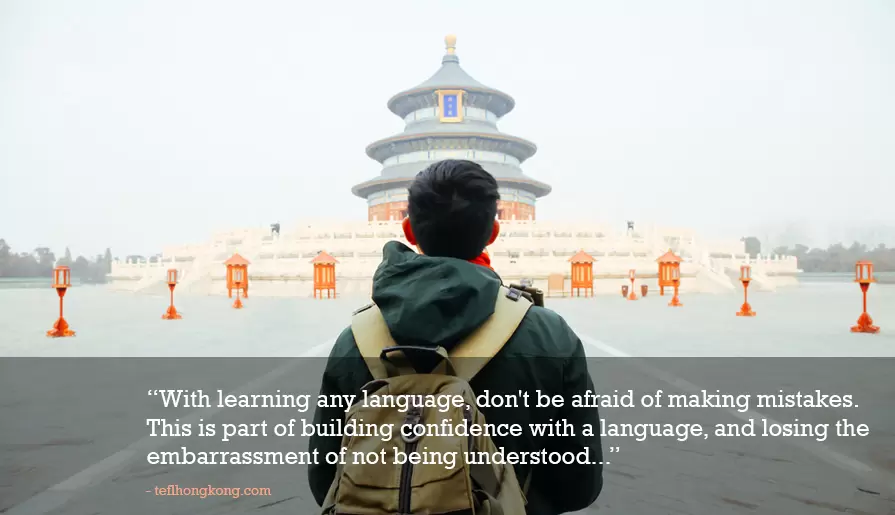
- By: Tom Garside
- In: TEFL China
With a new international economy, stronger scientific and academic development than ever before, and a population consisting of one in five humans on the planet, China is no more the ‘sleeeping dragon’.
The country has an insatiable appetite for English Language Education (ELE), as English is now a compulsory subject at all levels of education in China, and is assessed more thoroughly than in the past, as a key skill for the country’s international development.
This in turn means that more and more people are taking up teaching work in China, but if you are thinking of working there, how much do you know, and what do you need to know about this enormous but little-understood country?
Preparation
As a tightly-controlled communist country, it pays to know what you need to prepare in order to obtain a visa, work permit and all the other documentation required for an extended stay in China.
If in doubt, over-prepare, as it is better to have documents and not need them rather than get to the border and need them but not have them!
When you apply for a position in China, you will most probably be in contact with an HR person to guide you through the various application processes you need to go through in order to get the necessary paperwork. HR departments in China hold a much stronger role for foreign workers in China than in many other countries, as they are the gatekeepers for your visa application.
The process can be red-tape heavy and frustratingly unclear for everyone involved, so be patient and proactive in what you need to do, and you will stay on the right side at this important stage.
The local regulations governing documentation and procedures for work permits and visas differs from province to province in China, and major (Tier 1 and Tier 2) cities often have their own systems for doing things, so if you are trying to find out detailed information online, always double check it with someone who is in the province where you want to go.
Ask the school for another foreign teacher who you can contact, to ask them about the details of their applications; you often get a more realistic idea of what happens from the horse’s mouth.
Visa process requirements to teach English in China
As a general rule, a typical Chinese visa process for a foreign teacher requires the following documents:
- A minimum of a bachelor’s degree (plus one or two years’ experience in some provinces), apostilled by a notary public and stamped on the original by the embassy.
- A qualification in TESOL (120 hours, including face-to-face teaching assessment, apostilled and stamped.
- A criminal background check from your ‘home country’.
- A passport valid for the period you intend to stay in China.
- A Chinese visa application form.
- An invitation letter from the employer.
As these documents can take time to arrive, it’s best to get all of these together before booking your visit to the Chinese embassy, as applications are generally made in person by the applicant, and documents must be taken to and from the embassy by hand.
This means at least two trips to your nearest Chinese embassy for any application, or more if you don’t have the necessary documents on you, which can be frustrating.
Agents do operate a postal service for document delivery and pickup to and from embassies, but this is a paid service so it’s best to work out if this is worth it for you.
Arriving and culture shock
Anyone who has lived in China will tell you that the experience of arriving is like marmite (or vegemite, for that matter) – from the minute you step off the plane, you either love it or hate it.
My own family and I are lucky enough to love China deeply, but we have seen friends and relatives get off the plane and collapse into fear, frustration and anger within a day, and never recover.
There’s no getting away from it: China is an intense place. The weight of population, cultural conventions and the sheer size of the cities can be overwhelming, but if you embrace it and appreciate that everyone has to get on and do what they need to in order to make a good living, your perspective on what it means to be a part of Chinese society will grow.
As with travel to any new place, culture shock is somewhat inevitable, and China is no exception. The difference in attitudes, language, food, smells, sights and sounds will bowl newcomers over at first, but meeting new experiences with a smile will always help these experiences to be positive.
In China more than anywhere else I have travelled, you get back what you give out, so meeting every day with a positive outlook, making the effort to speak to people, and taking daily problems on the chin will help you to have a happier time, meet more people and integrate into life more easily.
Resistance to the way things are done in China can lead to a feeling of alienation or separation, which does not lead to a positive experience.
As a foreign professional in education in China, soon after arriving you will have two major duties: within a few days of landing (while that jet-lag and culture shock is still going strong).
Firstly, you are required to register your arrival at the local police office. This means you will be taken to an administrative police bureau by your HR contact, to sign that you have arrived, give your temporary address and place of work.
This will be your introduction to the public administration of Communist China. In these situations, be respectful in your behaviour, dress smartly and stay positive and calm, as the people working in this office have the power to accept or refuse your application with the movement of a stamp.
The second requirement for foreign workers is a full health check at a regional hospital in the city or area where you will be working. Many overseas workers obtain health checks in their home countries, but these are rarely accepted as part of visa applications to local immigration authorities. The Chinese version of these documents always trumps the international version, no matter how reputable the home government, academic or medical agency.
The health check can be confusing, as it typically involves several tests delivered at quickfire pace in different rooms or departments of a foreign hospital. There are ECGs, EKGs, blood tests, a chest X-ray, eye test, urine sample and other basic health checks, and you will find yourself whisked from room to room, possibly with other applicants, both Chinese and foreign, interested in the process.
This more than ever is the time to go with the flow with a smile on your face, and thank every doctor for their help. Again, the staff at the hospital have the power to help you or hinder your application, so be positive and get the result that you need to smooth the process.
Further Readings:
Living, Accommodation
Once you have got your paperwork out of the way, you may need to focus on finding a place to live. Often, this is provided by the employer, either in the form of a subsidised apartment owned by the school, on-campus accommodation where foreign staff live, or through a rental allowance which enables you to find a place by yourself which is paid or subsidised by your employer. The latter is my favoured way of living, as it gives you the freedom to explore and live without too many rules.
Staff accommodation often has rules and limitations, with some residences closing in the evening, meaning that there is in effect a curfew of 10 or 11 o’clock, which can be frustrating. With electricity and hot water also managed en masse, there is also a greater risk of problems as things are managed by several school departments rather than between you and a landlord. School accommodation has benefits, but it is worth talking to other staff members about this before making a decision.
Once you are settled, and ready to get out and about to see your new home, there are a few things to bear in mind:
Cost of living in China
The cost of living in China is low, though you can find shops and restaurants for every budget. Lunch can cost from around 10RMB at a market, to 1000RMB at a fancy restaurant. This means the value of money is up to the spender to decide.
From experience, some of the best food I’ve eaten in China has come at the lowest price, and some of the worst at the highest, so don’t always judge a restaurant by its menu. You can still live very well very cheaply, and the more people you talk to, the more great places you will find.
It is worth bearing in mind that there is a long history of bartering in China, so unless you are in a large shop with price tags and formal sales assistants, you may well be able to haggle prices. Learn a few bargaining phrases (‘it’s too expensive…’, ‘can you make it cheaper…?’) and get your numbers 1-10 down, and you will be cutting your shopping bills in half in no time. Embrace the haggling culture, and you will make new friends, save money and earn the respect of the shopkeepers in your area!
Also Read: Travelling and Saving while Teaching English in HK
Language
In order to really live in China, you will have to learn some Chinese phrases. So few foreigners make the effort to speak Chinese that even a simple ‘hello’ or ‘thank you’, pronounced properly, will raise a smile and a compliment.
Start with numbers 1-10, ‘hello’, ‘thank you’ and ‘do you have…’, along with some simple food words, and your life will get easier.
In many places, not speaking English means really not speaking English, so these few words will help you enormously. Most of all, as with learning any language, don’t be afraid of making mistakes. This is part of building confidence with a language, and losing the embarrassment of not being understood is an important step to being able to communicate.
Persevere and you will get there, and more doors will open into the beautiful culture of China.
Transport
Although many large cities in China now have underground metro systems, the best way to travel around a city stress-free (depending on the city, obviously) is often by taxi. Public taxis are cheap and generally in good condition, and you will see parts of the city away from the metro stations and bus stops by getting a taxi.
As always, get a second opinion about the city where you are living, and find out the best ways of getting from A to B, but from experience, a taxi ride is often the fastest and easiest way to get around.
Face
One aspect of Chinese culture which should not be dismissed is the concept of ‘face’. This is a challenge for many foreign visitors to China, but in reality it operates on quite simple terms: everyone has ‘face’, a kind of pride of standing with friends, colleagues, and a network of others who we come into contact with on a daily basis.
Face can be gained by being generous, showing humility, helping someone out, or doing someone a favour without advertising the fact too loudly. However, face can be lost by getting angry too easily, complaining too much or being aggressive or confrontational (many foreign workers in China fall foul of this without even realising it, by arguing petty battles and challenging the way things are done too openly).
Face is also lost through exposure or embarrassment, for example if a lie or mistake is exposed by a workmate. The level of shame brought about by loss of face can be devastating, and really uncomfortable, which is why small mistakes and white lies are often accepted more readily in China than in other countries.
Face acts as a kind of social buffer for people to measure the behaviour and values of others, so is worth taking into account when living in China, no matter what situation you are in.
Making others lose face can affect how people interact with you, and how much you get from your time in China (think about this in terms of the police station / health check situations, above, and you will see how this could be detrimental to you).
All in all, life in China can be frustrating, it can be beautiful and it can be hard, but the value of living well and integrating into the language and culture of this beautiful country pays off. The best experiences I have had in China have been with Chinese friends, in places I didn’t know existed until they showed me.
Also Read: How to live your best life as a teacher in Hong Kong
Be open to new experiences, and stay positive, and your time in China will be one adventure after another.
In part two of this article about living and working in China, we will look at language education in China, thinking about different kinds of teaching environment and what to expect from the job.
Please Share:This article was originally published on February 25, 2019 and was last updated on November 22, 2020.
Courses We Offer:

1. CertTESOL: Certificate in TESOL
A level 5, initial teacher training qualification for new and experienced teachers, enabling you to teach English anywhere in the world. The course is equivalent to Cambridge CELTA.
Learn More
Developed by our Trinity CertTESOL experts, for a comprehensive, self-paced learning experience. Earn an internationally recognized certificate and master essential teaching skills, accessible globally 24/7.
Learn More